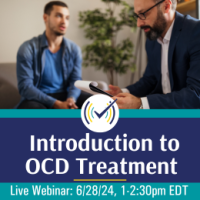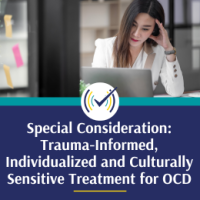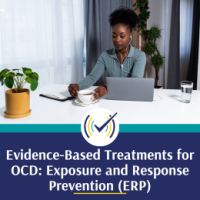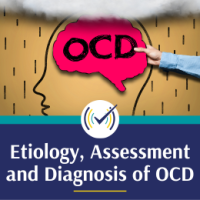The OCD Counseling Certificate Program consists of three online self-study courses and the Obsessive-Compulsive Disorder Counseling Certificate
This comprehensive OCD Training Certificate Program provides an in-depth examination of the etiological and maintaining factors of OCD. As OCD often co-occurs with other mental health conditions, this training provides training on differential diagnosis, as well as guidance on how to develop comprehensive treatment plans when individuals experience co-morbid OCD, including the use of exposure and response prevention (ERP).
A review of current literature and case examples highlights the treatment challenges, including ethical considerations, possible medical complications, recidivism rates, fair treatment projection, and potential long lengths of stay in treatment.
Additionally, the adaptations and considerations for providing quality care in a way that is both trauma-informed and culturally sensitive is emphasized. This intensive training certificate provides clinicians with evidence-based and practical tools to effectively and competently work with individuals with OCD in various treatment settings.
Courses included with this registration:
Etiology, Assessment and Diagnosis of OCD
Evidence-Based Treatments for OCD: Exposure and Response Prevention (ERP)
Special Consideration: Trauma-Informed, Individualized and Culturally Sensitive Treatment for OCD
Enrollment in this 3-course bundle also includes the Obsessive-Compulsive Disorder Counseling Certificate, which is available to participants once coursework has been completed.
These are non-interactive self-study online courses that consist of over 18 hours of video training content. (6+ per course)
The Obsessive-Compulsive Disorder Counseling Certificate (OCDCC) program requires completion of three courses:
- Etiology, Assessment and Diagnosis of OCD
- Evidence-Based Treatments for OCD: Exposure and Response Prevention (ERP)
- Special Consideration: Trauma-Informed, Individualized and Culturally Sensitive Treatment for OCD
Successful completion of each course will earn participants the OCD Counseling Certificate (OCDCC)
After participating in Etiology, Assessment and Diagnosis of OCD participants will be able to:
- Discuss the heritability of OCD.
- List at least two environmental factors that impact the development of OCD.
- Identify the diagnostic criteria for OCD, including rule-outs for the condition.
- Assess clients for overlapping symptom presentations and differentiate OCD from other diagnoses.
After participating in Evidence-Based Treatments for OCD: Exposure and Response Prevention (ERP) participants will be able to:
- Explain the rationale for utilizing emotional exposure strategies for the management of OCD symptoms.
- Describe two theoretical principles of exposure.
- Create an individualized exposure hierarchy using a sample case.
- Discuss the benefits and challenges of incorporating psychopharmacological interventions for individuals with OCD.
After participating in Special Considerations: Trauma-Informed, Individualized, and Culturally Sensitive Treatment for OCD participants will be able to:
- List at least two adaptations required for treating children with OCD.
- Describe at least one unique consideration of treating perinatal OCD.
- Identify at least two intersectional factors that should be considered when individualizing OCD treatment.
- Apply the principles of trauma-informed care to exposure-based treatment for OCD.
Melanie Smith, PhD, LMHC, CEDS-S
Melanie Smith, PhD, LMHC, CEDS-S, is the Director of Training for The Renfrew Center for Eating Disorders. In this role, she provides ongoing training, supervision and consultation to clinicians across disciplines for the purpose of continually assessing and improving competence in the treatment of eating disorders. Dr. Smith is co-author of The Renfrew Unified Treatment for Eating Disorders and Comorbidity Therapist Guide and Workbook (Oxford University Press), is a Certified Eating Disorders Specialist and Approved Supervisor, and is a Certified Therapist and Trainer for the Unified Protocol for the Transdiagnostic Treatment of Emotional Disorders (UP). In addition to her work with the Renfrew Center, Dr. Smith maintains a telehealth private practice specializing in the supervision and consultation of registered mental health counselor interns (Florida) and individuals seeking eating disorder specialist certification through the International Association of Eating Disorders Professionals (iaedp).
You can find more information about Dr. Smith here and the Renfrew Center here.
Credit Hours: This program consists of 18 continuing education hours of credit. A separate certificate of completion is issued with each course.
Counselors: Telehealth Certification Institute, LLC has been approved by NBCC as an Approved Continuing Education Provider, ACEP No, 6693. Programs that do not qualify for NBCC credit are clearly identified. Telehealth Certification Institute, LLC is solely responsible for all aspects of the programs.
Telehealth Certification Institute, LLC is recognized by the New York State Education Department's State Board for Mental Health Practitioners as an approved provider of continuing education for Licensed Mental Health Counselors. #MHC-0048.
Marriage and Family Therapists: Many MFT licensing boards accept our courses or one of the approvals which we have from professional associations. You can check with your board to determine if your licensing board would accept this course.
Social Workers: Telehealth Certification Institute LLC, #1609, is approved to offer social work continuing education by the Association of Social Work Boards (ASWB) Approved Continuing Education (ACE) program. Organizations, not individual courses, are approved as ACE providers. State and provincial regulatory boards have the final authority to determine whether an individual course may be accepted for continuing education credit. Telehealth Certification Institute LLC maintains responsibility for this course. ACE provider approval period: 05/02/2021 – 05/02/2024. Social workers completing this course receive 18 clinical continuing education credits.
Telehealth Certification Institute, LLC is recognized by the New York State Education Department's State Board for Social Work as an approved provider of continuing education for Licensed Social Workers #SW-0435.
Addiction Professionals: This course has been approved by Telehealth Certification Institute LLC, as a NAADAC Approved Education Provider, for educational credits, effective 2/20/2024. NAADAC Provider #193104, Telehealth Certification Institute LLC is responsible for all aspects of the programing.
Psychologists: Telehealth Certification Institute LLC is approved by the American Psychological Association to sponsor continuing education for psychologists. Telehealth Certification Institute LLC maintains responsibility for this program and its content.
Telehealth Certification Institute, LLC is recognized by the New York State Education Department’s State Board for Psychology as an approved provider of continuing education for Licensed Psychologists #PSY-0128.
Art Therapists: Telehealth Certification Institute, LLC is recognized by the New York State Education Department's State Board for Mental Health Practitioners as an approved provider of continuing education for Licensed Creative Arts Therapists #CAT-0093.
Other Professionals: This course qualifies for 1080 minutes of instructional content as required by many national, state and local licensing boards and professional organizations. Retain your certificate of completion and contact your board or organization for specific filing requirements.
These are non-interactive, self-study courses.
The OCD Counseling Certificate program consists of three courses:
- Etiology, Assessment and Diagnosis of OCD
- Evidence-Based Treatments for OCD: Exposure and Response Prevention (ERP)
- Special Consideration: Trauma-Informed, Individualized and Culturally Sensitive Treatment for OCD
Successful completion of each course will earn participants the OCD Counseling Certificate (OCDCC)
This is a non-interactive, self-study course. Teaching methods for this course include recorded lectures, videos, a post-test, and a course evaluation.
This program was recorded 1/19/24, 1/26/24, and 2/2/24






